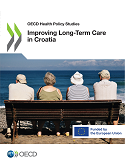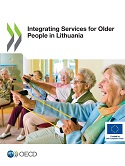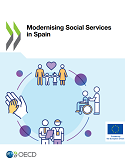Health policies and data
Ageing and Long-term Care
|
As people get older, it becomes more likely that they will need day-to-day help with activities such as washing and dressing, or help with household activities such as cleaning and cooking. This type of support (along with some types of medical care) is what is called long-term care. Demand for long-term care is expected to rise, thanks in part to ageing populations and increasing prevalence of long-term conditions such as dementia. The OECD has been at the forefront of analysis on long-term care since 2005, reviewing and providing best practices on LTC key issues. |
|
|
|
|
|
|
COVID-19 and resilience in long-term care
Across OECD countries, long-term care users and their carers have been disproportionately affected by the COVID-19 pandemic. The OECD has documented the impact of the COVID-19 pandemic and has analysed policy responses in the long-term care (LTC) sector. The OECD also sets out policy avenues to make LTC systems more resilient in the future.
- Read Chapter 7 on Strengthening resilience in long-term care in the report Ready for the Next Crisis? Investing in Health System Resilience (February 2023)
- Read our COVID-19 Brief Rising from the COVID 19 crisis: Policy responses in the long-term care sector (December 2021)
- Read the working paper COVID-19 in LTC: impact, policy responses and challenges (October 2021)
- Key Insights & Proposed Solutions From the Future of Care and the Caregiving Workforce: Lessons and Insights from the COVID-19 Experience, Proceedings from the Expert Workshop co-Hosted by the OECD, the Global Coalition on Aging and Home Instead (October 2021 - agenda)
- Read the presentation COVID-19 and long-term care systems: perspectives from France, Italy and Portugal, and an overview of OECD responses (July 2021 webinar)
Implementing long-term care reforms
The ELS Ageing and Long-term care team of the OECD and the DG REFORM of the European Commission are cooperating in providing technical support to countries that want to reform the long-term care systems.
 |
Improving home care for older people in CroatiaThe Ministry of Labour, Pension System, Family and Social Policy of Croatia requested technical assistance from the European Commission and the OECD to support the reform process and develop non-institutional forms of elderly care, particularly in older people’s homes and in local communities.
|
Reform of Long-term Care in Greece
|
|
 |
Strengthening long-term care for older people in LithuaniaThe Ministry of Health of Lithuania requested technical assistance from the European Commission and the OECD to support the reform process on care for older people, particularly home-based and community-based care. The OECD carried out an analysis of the long-term care system, including a survey and focus group discussions, and also discussed pathways to reforms at key stakeholder consultations and during a workshop organised on June 2, 2022 in Vilnius.
|
 |
Modernising social services in SpainThe Ministry of Social Rights and Agenda 2030 of Spain has requested technical assistance from the European Commission and the OECD to support the reform process on social services, namely on improving the national framework and the information system for social services.
|
Data on long-term care
Access our latest data from OECD Health Statistics in the dataset Long-term care resources and utilisation:
- Long-term care workers (formal sector)
- Beds in nursing and residential care facilities
- Long-term care recipients
Publications
- The latest Health at a Glance 2023: OECD Indicators contains a chapter on Ageing and Long-term Care (Chapter 10) (November 2023)
- Time for better care at the end of life (February 2023)
- Supporting informal carers of older people - Policies to leave no carer behind, OECD Health Working Paper No. 140 (May 2022)
- Antimicrobial resistance in long-term care facilities, OECD Health Working Paper No. 136 (February 2022)
- Pricing long-term care for older persons, WHO Centre for Health Development (Kobe, Japan), Organisation for Economic Co-operation and Development, Barber, Sarah L, van Gool, Kees, Wise, Sarah. et al., August 2021. Access Country case studies and policy briefs, Interviews with authors, and all background material.
- Spending on Long-term Care, Brief (November 2020)
- Workforce and safety in long-term care during the COVID-19 pandemic, Policy Brief (June 2020)
- Who Cares? Attracting and Retaining Care Workers for the Elderly (June 2020)
- Assessing the Comparability of Long-Term Care Spending Estimates under the Joint Health Accounts Questionnaire, Technical Paper (May 2020)
- The effectiveness of social protection for long-term care in old age, OECD Health Working Paper No. 117 (April 2020)
- Promoting Healthy Ageing - Background report for 2019 G20 Japanese Presidency and Booklet (October 2019)
- Care Needed: Improving the Lives of People with Dementia (2018)
- Preventing Ageing Unequally (2017)
- Measuring social protection for long-term care, OECD Health Working Paper No. 93 (2017)
- Addressing Dementia: the OECD Response (2015)
- A Good Life in Old Age? Monitoring and Improving Quality in Long-Term Care (2013)
- Help Wanted? Providing and Paying for Long-Term Care (2011)
Further reading
- Towards person-centered integrated care in Italy
- Boosting Social Inclusion in Spain - Improving Pathways and Co-ordination of Services (September 2023)
- Health Spending Projections to 2030 - New results based on a revised OECD methodology (2019)
- Health Reform: Meeting the Challenge of Ageing and Multiple Morbidities (2011)
- Long-term Care for Older People (2005)
- Long-term Care for Older People: OECD study (2001-2004)
- G7 Health Ministerial meetings
Contact us
- Ms. Ana Llena-Nozal: ana.llena-nozal@oecd.org
 Follow us on Twitter via @OECD_Social
Follow us on Twitter via @OECD_Social
Related Documents





